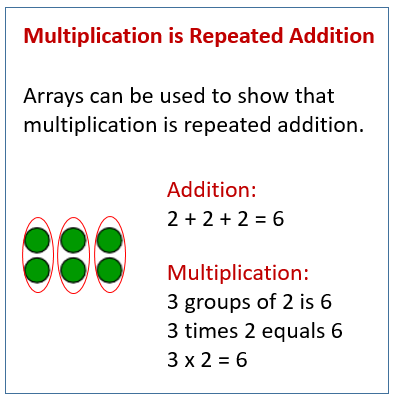Addition and Arrays (Grade 2)
Related Pages
More Lessons for Grade 2
Common Core for Grade 2
These lessons, with videos, examples, solutions, and songs, help Grade 2 students learn how to use addition to find the total number of objects arranged in rectangular arrays with up to 5 rows and up to 5 columns; write an equation to express the total as a sum of equal addends.
Common Core: 2.OA.4
Suggested Learning Target
- I can use addition to find the total number of objects in an array.
- I can write an addition equation (e.g., 3 + 3 + 3 = 9) to express the total as a sum of equal addends.
- I can represent the total number of objects arranged in a rectangular array as an expression with the repeated addition of number of objects in each row (or column). For example if there are 3 rows with 4 objects in each row, I can write the expression 4 + 4 + 4.
- I can construct rectangular arrays using concrete manipulatives.
- I can use repeated addition to find the number of objects in a an array.
- Knowledge of rectangular arrays as a foundation for multiplication and a model of the connection between addition and multiplication.
The following diagram shows that multiplication is repeated addition. Scroll down the page for examples and solutions using multiplication as repeated addition.

Arrays and repeated addition
What is an array?
An array is a group of objects arranged in rows and columns.
We can use arrays to show repeated addition.
Multiplication is repeated addition.
We can use arrays to show multiplication as repeated addition.
Multiplication Vocabulary
The whole numbers multiplied together are called factors.
The answer to a multiplication problem is called a product.
2.OA.4 Repeated Addition with Arrays
Multiplication shows the total number of items in a certain number of groups.
Arrays can be used to help solve multiplication problems.
Examples:
-
There were 3 spiders on the playground. Each spider made 3 webs. How many spider webs in all?
-
There were 4 flowers with 3 bees on each flower. How many bees in all?
-
Isabella went to the park. She saw 2 butterflies on each of the 5 trees. How many butterflies did she see?
-
Liam found 4 ladybugs on each of 4 branches. How many ladybugs did he find in all?
Arrays and Addition
Rows go side to side
Columns go up and down
Add by the rows and add by the columns.
Multiplication With Arrays
Multiplying with arrays for second grade.
How to use arrays to model repeated addition and multiplication?
Multiplication and Arrays
What are arrays and how do they show multiplication?
Commutative Property - You can multiply numbers in any order and the product will be the same.
Arrays
How to add items in an array?
Example:
- Draw two arrays that each show 3+3+3+3.
Review
- Draw an array for 3 × 5.
- What is the repeated addition for 3 × 5?
- What is the product for 3 × 5?
Try out our new and fun Fraction Concoction Game.
Add and subtract fractions to make exciting fraction concoctions following a recipe. There are four levels of difficulty: Easy, medium, hard and insane. Practice the basics of fraction addition and subtraction or challenge yourself with the insane level.

We welcome your feedback, comments and questions about this site or page. Please submit your feedback or enquiries via our Feedback page.